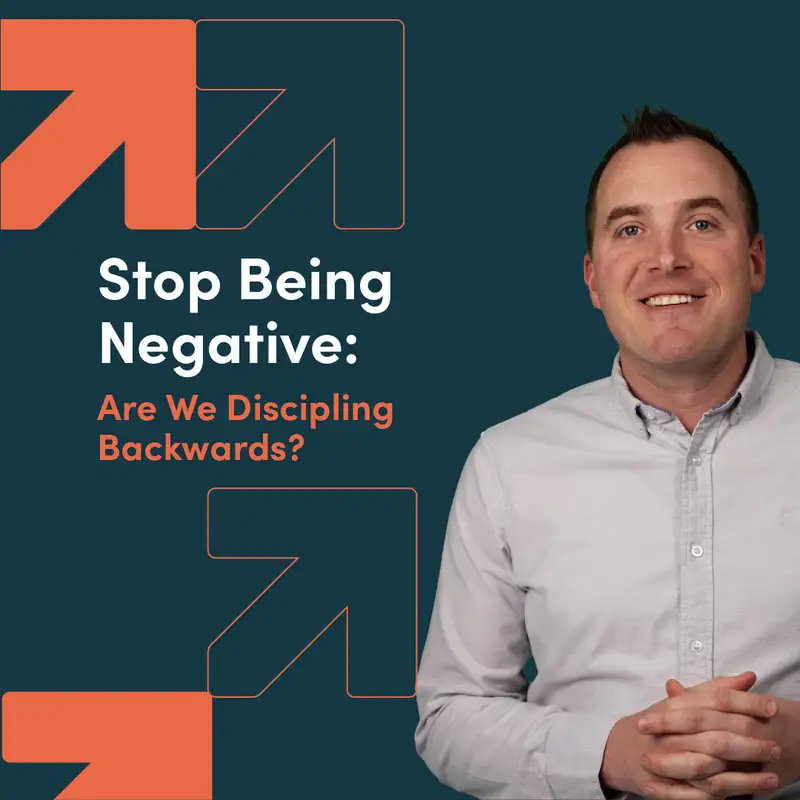Stop Being Negative: Are We Discipling Backwards?
Hello, everyone. Thanks for listening to Wake Up, Look Up, a podcast where we connect events happening in real time to the gospel of Jesus Christ. I'm Zach Weihrauch. And in today's episode, we're talking about the need to stop being negative. We're asking the question, are we discipling backwards?
This is prompted by an article that was in the Atlantic recently by Russell Shaw about the wrong way to motivate your kid. Now this is gonna sound like a parenting episode, but it isn't. I promise. This is one that will apply to everyone. Shaw talks about the natural tendency of parents to punish struggling children by taking away what they love.
He gives the example of a kid who's struggling academically but is a great wrestler, loves the sport of wrestling, and how parents are tempted to say if your grades don't improve, you won't be allowed to wrestle. And he argues that's a backwards way of thinking about it. And he builds on an idea from the psychologist Robert Brooks about this thing called islands of competence. Basically, Robert Brooks' argument is that we're all good at different things. We all have islands of competence mixed in with things we're not great at.
And then, actually, parents should help children learn to identify their islands of competence, in this case, wrestling, and build from that, not take away from that. In other words, say, hey. The things that make you a good wrestler, the toughness, the tenacity, the discipline, the practice are the same kinds of things we want you to apply academically or even beginning to acknowledge that a kid might not be a great academic student, but the skills that apply to wrestling might make him a tremendous tradesman, for example. The point is that strength based parenting lowers negativity in a kid's life and builds confidence, the kind of confidence they can launch from to go attack all the things that they're not naturally good at. Shaw argues that there are five steps to this, identifying what they're good at, naming it, building on it, applying themselves in it and those concepts to other things, and then celebrating it.
The argument is to build on success instead of weakness. Now like I said, all that applies to parenting, but it also applies to discipleship. When I read Schall's argument, I thought this is what so many Christians get wrong. Because in the same way, a teenager might be good at some things and bad at others. Most of us in our attempts to follow Jesus have areas of success, islands of competence, and areas of weakness.
Most of the church conversation tends to be about our weaknesses. It tends to be about sin, about where we need to grow, where we need to fight. And listen, all of that is important, and we'll do episodes on those things in the future. But I wanna argue that we would experience similar benefits if we began to build our discipleship approach on what we were good at instead of what we're bad at. Here's some reasons why.
The first thing is a major biblical theme is that weakness never stops God's work. It's really important to understand the Bible is full of flawed characters, characters who consistently and constantly fall short of who God wants them to be. But God's faithfulness keeps the story going. It's the same God who told the apostle Paul in second Corinthians 12, my grace is sufficient for you. The emphasis needs to be on God's faithfulness in our weakness and not just our weakness.
The the second reality, though, is we are called to lean into God's faithfulness and to lean into God's movement. The apostle Paul says in Galatians five, we should keep in step with the spirit. This means asking the Holy Spirit, where are you working, looking for areas of progress, areas of growth, areas of development. And instead of saying, well, sure. Yeah.
I'm doing well here, but I'm not doing well there. Leaning into where we're doing well and and realizing the Holy Spirit is on the move in that area of our lives, and we want to join him. This will result in celebrating the presence of the Holy Spirit and God's grace in our lives, which actually fuels our faith. The new testament is full of examples of the writers celebrating what God is doing and then building from that to what they hope he will do, what they want him to do moving forward. The we wanna move more towards emphasizing gifts and not failures.
The reality is that the Bible tells us the holy spirit has gifted each one of us in unique ways to the contribution of the church. We have to stop focusing all the time on what we're not because when we think about what we're not, we're paralyzed. But when we think about what we are, we realize we have a unique role to play in the mission of God and the kingdom and kingdom's advance in our context. The the consequence of this will be that we'll begin to see our community as spirit filled. Look at that guy's growth.
Look at her strengths. And the result of that will be marveling at God's grace and the positive things that are happening instead of navel gazing about negativity all the time. So that maybe just like in acts two, the local church there and our local churches might be filled with awe of a God who's doing so many wonderful things. Today, stop for a second and list out all the areas where you're growing, all the good things that you've seen, and build your confidence to move forward off of that. God is on the move in your life.
Don't miss it. Hey. Thanks for watching this episode of Wake Up, Look Up. If you enjoyed it, please help us get the word out by sharing it with someone you think might benefit from it. And while you're here, make sure to subscribe to our YouTube channel to get further content or even download the CCC app where you'll find even more resources to help you grow in your faith and relationship with Jesus Christ.
Have an article you’d like Pastor Zach to discuss? Email us at wakeup@ccchapel.com!
Creators and Guests


